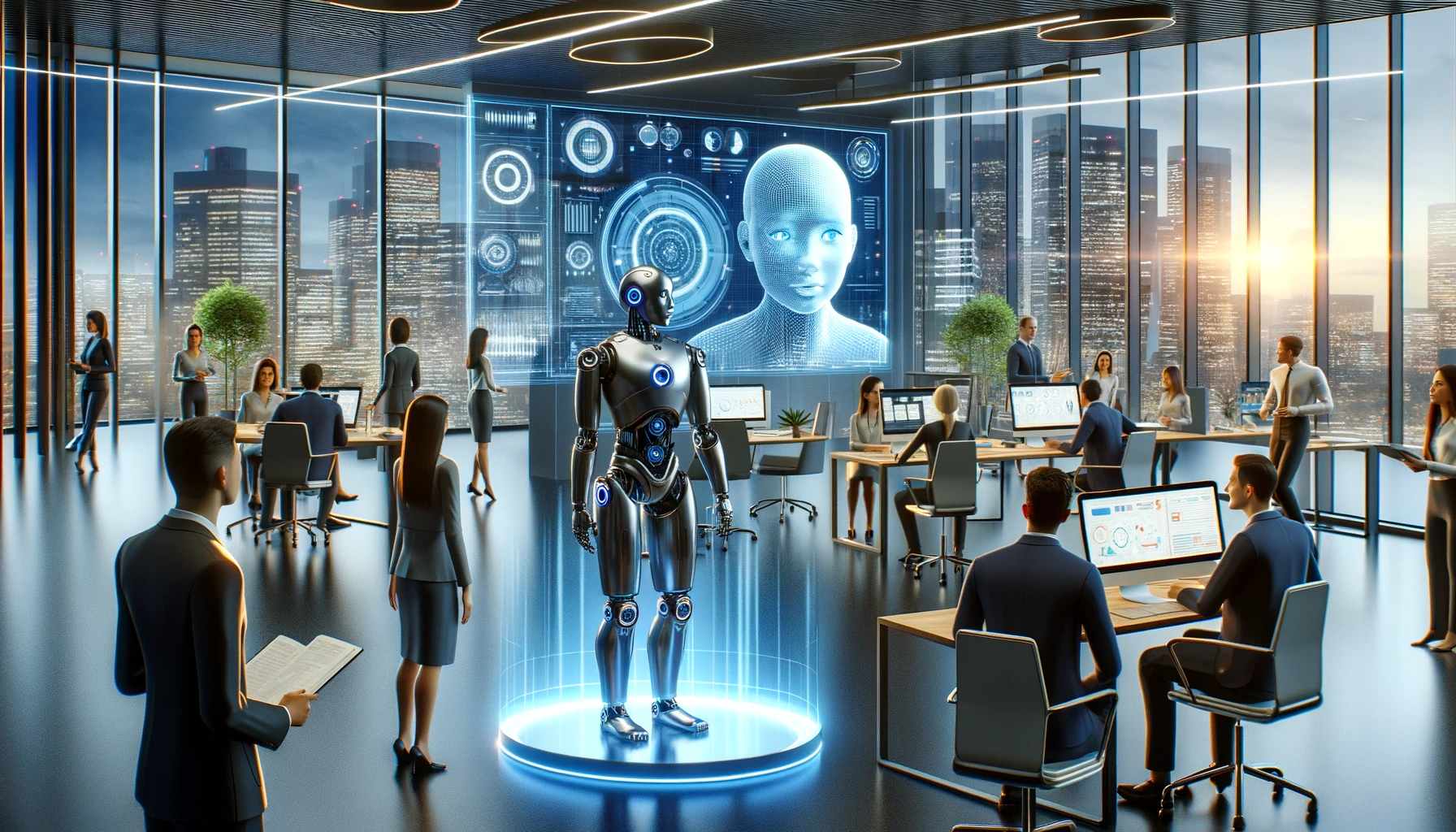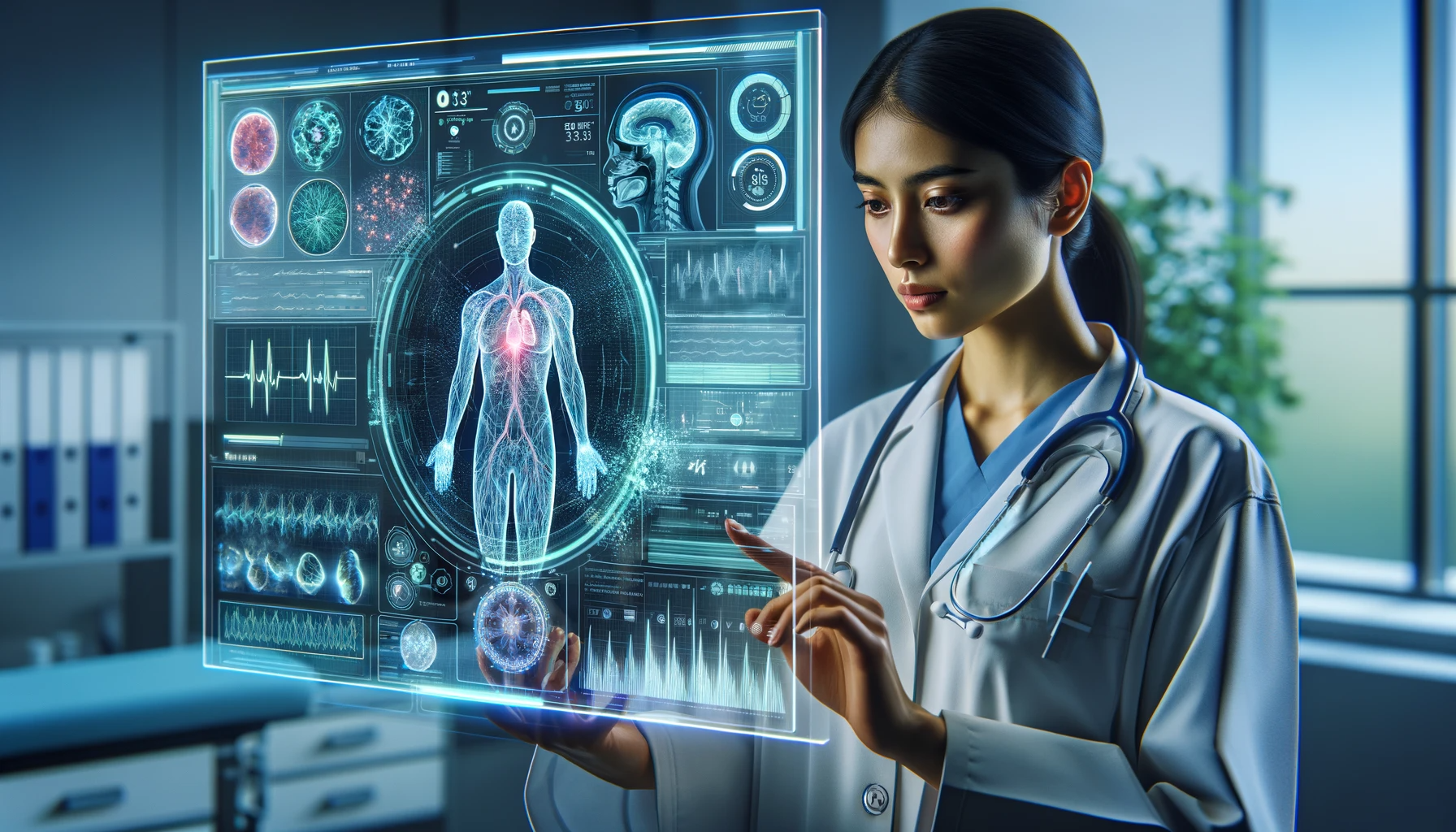Imagine a future where your coffee is brewed by a robot barista. It’s not science fiction; it’s the trajectory we’re on with AI shaping our work and life.
We’re diving into this brave new world, looking at jobs AI might take over and the fresh roles it will create.
In this week’s podcast episode, we tackled how AI makes remote work thrive, balances ethical tightropes, boosts productivity like never before, and stays sharp in an economy that never stops learning.
Get ready for an economic shake-up as industries evolve under artificial intelligence’s influence.
The Automation Revolution and Job Displacement
Think of the last time you ordered food through an app.
Your order zipped across the web, maybe even with a suggestion for that extra side of fries.
This is AI at play, streamlining services but also reshaping jobs as we know them.
Industries at Risk of Automation
Sectors like manufacturing have long danced with automation.
Robots build cars; algorithms manage stock levels.
Retail isn’t far behind, with self-checkouts and online shopping algorithms suggesting your next purchase based on past behavior.
The numbers speak volumes: experts predict that 85 million jobs may be displaced by automation by 2025. These are not just guesses; they’re projections grounded in current trends where efficiency often trumps human touchpoints in certain industries.
New Job Creation Through AI
A flipside exists though — AI doesn’t only take away, it gives too.
We’re talking about new roles that demand digital dexterity: data analysts who interpret machine learning results or drone operators surveying construction sites from above.
Skills intertwining tech savvy with creative problem-solving will become hot commodities because what’s clearer than ever is this: robots might run routines better than us humans, but they don’t innovate or empathize quite as well — not yet anyway.
We must pivot our skills to stay ahead in the job market evolution fueled by artificial intelligence advancements.
The Changing Nature of Work
Let’s zoom out a bit now.
Consider how tasks themselves are morphing under AI’s influence.
Customer service agents use chatbots to field initial inquiries before stepping into more complex conversations.
This fusion between man and machine requires workers to refine their interpersonal abilities while mastering new tools designed to augment their performance — a dual-edged sword cutting through old job descriptions and carving out modern ones.

The Rise of Remote Work and AI’s Role
You’ve probably noticed how home offices have sprung up everywhere lately.
It’s not just about avoiding traffic anymore; it’s remote work turning mainstream — and fast.
In fact, in the past five years, remote work has shot up by over 44%, largely enabled by AI-driven platforms smoothing out collaboration kinks for teams spread across different zip codes — or continents.
AI-Powered Collaboration Tools
Gone are the days when team synergy was confined to physical boardrooms. Now, AI steps in as our virtual facilitator.
We’re seeing tools that can anticipate project hiccups before they happen or even nudge us when communication lapses seem imminent.
Imagine having an assistant who never sleeps — that’s what these platforms offer.
Suddenly, your teammate across the ocean is as connected as if they were right next door because AI breaks down those virtual walls with startling efficiency.
Impact on Work-Life Balance
You might wonder: does this tech-driven freedom come at a cost? The answer isn’t simple but let’s dive into some possibilities.
If your living room becomes your workspace, drawing boundaries gets tricky. You’re saving time on commutes but potentially blurring lines between ‘on’ and ‘off’ hours. But there’s hope.
Smart scheduling tools powered by AI could be our saving grace here. They help us clock out mentally too so we can recharge fully without losing touch with our tasks or teams.
Case Study: Artificial Intelligence in Healthcare
Artificial intelligence is reshaping healthcare as we know it.
Imagine a world where your health can be in the hands of technology capable of learning from millions of medical cases, patterns, and research data points.
Personalized Treatment Plans Tailored by AI
Gone are the days when one-size-fits-all treatments were the norm.
In steps artificial intelligence with its ability to sift through vast amounts of patient data and medical information quickly — offering personalized care like never before.
This shift towards customized treatment plans could dramatically improve outcomes for patients worldwide.
Predictive Diagnostics: A Leap Forward in Early Detection
Early detection saves lives — it’s that simple.
AI systems are becoming increasingly adept at recognizing complex disease patterns early on, often long before human doctors would spot them.
The result? Faster interventions, better chances of recovery, and fewer burdens on our healthcare system overall.
Cutting-Edge Research Powered by Machine Learning
We’re talking about algorithms that can predict drug interactions or side effects faster than any traditional lab work ever could.
A push towards precision medicine has been made possible because AI helps identify which drugs might work best for specific populations based on genetic markers.
Surely this is just scratching the surface.
The global market size for these innovative services shows an astonishing projection: they say it will hit $45.2 billion soon.
With such groundbreaking advancements at our fingertips, we stand on the cusp of a new era where artificial intelligence not only complements but elevates every aspect of healthcare, making sure each patient receives care that’s tailored just for them.

Ethical Considerations in AI Deployment
When we talk about ethics and AI, the conversation often steers toward bias.
AI algorithms can inadvertently echo human prejudices.
This issue touches on everything from credit approvals to job hiring, shaping who gets opportunities and who doesn’t.
Bias and Fairness in AI Algorithms
We’ve seen that even with good intentions, biases slip into algorithmic decisions.
The real trouble starts when these biased systems are used for critical decisions like recruiting or lending.
A disturbing reality surfaces: certain groups could be unfairly excluded based on flawed data processing.
Privacy Concerns with Workplace Surveillance
And then we have personal privacy. As companies turn to sophisticated monitoring tools powered by AI, employees’ boundaries get tested.
Did you know that 58% of consumers worry about their privacy rights being infringed upon by AI?
These stats hint at a growing concern over how much employers watch and analyze our every move.
Lifelong Learning and Reskilling for an AI World
Imagine a world where half the workforce needs to learn new skills just to keep up with technology. That’s not a far-off scenario; it’s what we’re facing by 2025.
AI is reshaping our job landscape, pushing us towards continuous learning as a staple of professional life.
The Role of Educational Institutions
Schools and universities aren’t sitting idle. They’re overhauling curricula with an eye on the future, prepping students for jobs that might not even exist yet.
This shift isn’t just about tech skills — it’s about thinking critically and solving complex problems in an AI-driven economy.
Courses are getting more interdisciplinary, blending computer science with ethics, psychology, and other fields to create well-rounded graduates ready for tomorrow’s challenges.
Corporate Training Programs
You’ve heard it before: change is the only constant. Companies get this and are pouring resources into training programs to help their teams adapt — and fast.
We’re talking workshops, online courses, you name it — all designed to give employees the tools they need to work alongside AI rather than be replaced by it.
The aim? To foster agility so folks can pivot as needed when new technologies roll out or business strategies evolve due to technological advancements.
How AI Will Impact the Future of Work and Life
Look at the horizon. How AI will impact the future of work and life is clear now: automation may take some jobs but it’s also crafting new ones.
Think adaptability. Skills matter more than ever, so keep learning.
Embrace change. Remote work isn’t just a trend; it’s here to stay with AI smoothing out the edges.
Remember balance — it’s key for that sweet spot between work and home life.
Tread carefully though. Ethics can’t be an afterthought when we’re deploying AI in our workplaces or lives — fairness and privacy must sit front row.
Dive into efficiency like never before because productivity is set to soar with AI on board, boosting not just businesses but whole economies too.
This isn’t a drill — it’s reality knocking on our doorsteps, ready or not!